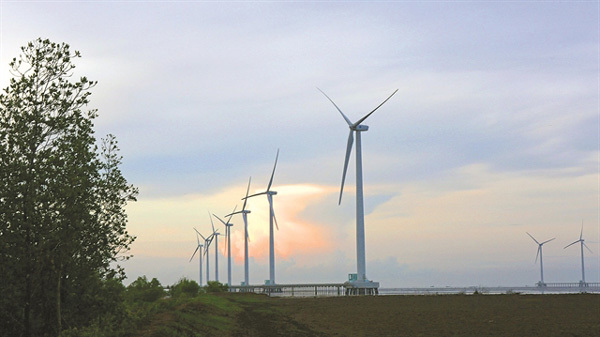Mekong Delta needs to adapt to climate change during transformation
Mekong Delta turns to tech to fight climate change
 |
| Wind power turbines in the Cuu Long (Mekong) Delta province of Bac Lieu. The province has a plan to develop up to 400MW of wind power by 2020 and 1,500MW by 2030. — VNA/VNS Photo Ngoc Ha |
He was speaking during a conference on evaluation of two-year implementation of government’s resolution on climate resilient and sustainable development of the Mekong Delta.
Phuc has instructed relevant agencies, local authorities enterprises and people in the country especially Mekong Delta region to take advantage of these achievements to adapt to climate changes.
Challenges caused by nature and climate changes could be opportunities for the region’s people if they know how to take advantage of them, he said.
“It is a worry that many people are still not aware about challenges [caused by climate changes] while many enterprises also not ready to adapt to these challenges and global warming,’ he said.
Vietnam is one of ten countries severely affected by climate change in Asia, he said, adding that rising sea levels and other environmental issues hit the millions of people in the Mekong Delta hard.
According a recent statistic, 1.7 million of people have moved from the region to other southern cities.
The region plays an important role in ensuring food security for the whole country but also Asia so there will be problems if sea level rising is not resolved, he said.
Phuc called fo closer co-operation between scientists, counsellors, local authorities, enterprises, and residents to work together to find solutions.
He also instructed HCM City’s authorities to become “a conductor of a musical band” to set up a framework for co-ordination between it and the Mekong Delta region to develop.
Results
Minister of Natural Resources and Environment Tran Hong Ha said nearly two years after the implementation of the resolution to sustainably develop the Mekong Delta, many projects and planning for the development to adopt with climate changes were approved.
With the government and local authorities ‘s efforts in improving environment for investment, the region has attracted many investors and reached impressive growth of gross domestic product.
The government has issued many policies and methods for investment promotion and market expansion.
Agricultural production structure has been transformed to increase seafood, fruits and decreasing paddy rice.
Large scale production zones which focus on main agricultural products such as shrimp, tra catfish, fruits and paddy rice and apply technologies in processing have been set up.
The industrial restructure has focused on reducing environmental pollution and develop processing industries to increase values of agricultural products.
The region has focused on developing of alternative energy with many wind and solar projects underway.
Programmes have also been implemented to solve river and sea erosion. Traffic infrastructure have been built to link provinces and cities in the region.
However, connections are still limited and are not close to HCM City.
Minister of Transport Nguyen Van The admitted these things are barriers which will be solved in future.
Highways and expressways linking the region to the HCM City; between sea ports and economic zones and border gates will be gradually completed.
They include Trung Luong- My Thuan- Can Tho, Soc Trang- Can Tho- Chau Doc and others.
More streets connecting with the region and Cambodia also will be built to develop the former further.
Ousmane Dione, World Bank Country Director for Viet Nam, said: “As a large wetland, the Delta is a complex and fragile entity. Greater connectivity should involve climate-resilient infrastructure and regionally suitable multimodal transport investments including inland waterways.”
The efficiency of logistic services can be raised by tapping into the Delta’s inland waterway network, enhancing multi-modal connectivity and making investments on main supply corridors, he said.
“Improvements in feeder waterways and roads at commune and provincial level will reduce transport costs from production points to markets and better link poorer and more remote producer communities with market centers,” he added.
Improved connectivity also requires upgrading the efficiency and safety of South Waterways Logistic Corridors, he said.
In November 2017, when the Government issued Resolution 120 on Sustainable Development of the Mekong Delta in Response to Climate Change, it recognised that a climate resilient, prosperous, and sustainable Delta is not an option, it is a must, he said.
More recently, this commitment was reinforced, with the approval of the overall Action Plan for Resolution 120, he added.
He said delivering Resolution 120 requires that climate-smart and low-impact agriculture and aquaculture in the delta be professionalised and focus on adding value.
Agriculture-based industry, a major player in the future development of the Delta, will have to focus its efforts on less volume and more value, he said.
“Knowledge and support services, risk management instruments, supporting infrastructure, and private investment are all necessary for this change,” he said.
The future of agriculture in the Delta, will also require cooperatives to build value chains, adopt helpful technologies and work closely with companies, he said.
“The Delta can then become an agribusiness region that remains one of the most productive and sustainable agricultural regions worldwide,” he added.
VNS
 The Fourth Industrial Revolution has created many technological achievements to help people conquer nature, Prime Minister Nguyen Xuan Phuc said yesterday.
The Fourth Industrial Revolution has created many technological achievements to help people conquer nature, Prime Minister Nguyen Xuan Phuc said yesterday.